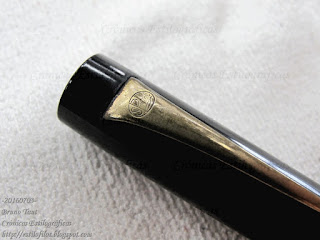Well, that idea has an obvious precedent in Tokyo in the 1930s.
Externally, the pen is a boring-looking copy of the Parker Duofold. The filling system is a Japanese eyedropper, like most pens of the time (around 1930) in Japan. The ebonite barrel is engraved with the brand name, “EAST”, and the text “FOUNTAIN PEN / MADE IN TOKYO”. On the clip we find a logo where we can read “Special”.
Then, everything changes when we open the pen.
This unique nib is formed by three different gold plates at 120° of each other. These plates are somehow connected at the central axes of the pen, and their ends are iridium-tipped and polished. The space outside these plates is used for the feeds.

Engraved on the nib, we can see the purity of the gold --14 K-- and something like "NOxxx". Those x are not readable. But this nib is make of 14 K gold.
The result is a very rigid nib able to write in all positions.
These are the dimensions of the pen:
Length closed: 120 mm
Length open: 108 mm
Length posted: 151 mm
Diameter: 11 mm
Weight: 13.4 g (dry)
Quite an experiment, but the manufacturing process of this nib sure was not cheap. This pen, finally, is extremely rare, and very little seems to be known about it.
Eboya Hôga – Diamine Graphite
Bruno Taut
Nakano, July 3rd, 2016
etiquetas: East, plumín, soluciones técnicas
Bruno Taut
Nakano, July 3rd, 2016
etiquetas: East, plumín, soluciones técnicas
















5 comments:
Thanks for sharing this.
Informative, as ever. Ross Stutler reports that the Trident was produced following Sailor's purchase of the design from Spacer. Were there interactions between the people who produced the East model and Spacer's? Did the East just come and go, with no patent legacy? Did run-up to WWII just shut East down, or were they gone before that?
Thanks, Saltire Turqouise and Paul Bloch, for your comments.
I cannot answer your questions now, Paul. A lot more research needs to be done, and not much can be found about this brand named East. The search continues, as is often the case.
Thanks to both of you for your moral support.
BT
Very interesting entry, as always. There is a peculiar thing that draws my attention and that is a deep groove on the side of the feeder. Is it functional or is it a defect as a consecuence of a previous handling?
Congratulations for the blog
Thanks, Antolin, for passing by and commenting.
That groove seems to be functional. I need to do some more research and write a second part to this text.
Cheers,
BT
Post a Comment
Your comments are welcome and appreciated.